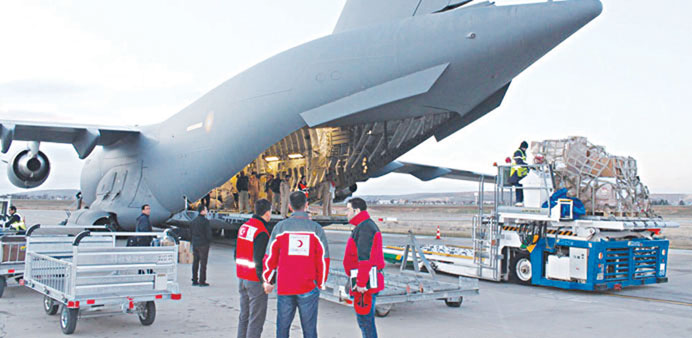|
|
The Qatar Red Crescent spent around QR220mn for its Syria-related relief operations last year and expects to exceed that amount this year, secretary general Saleh Ali M al-Muhanadi told Gulf Times.
In an interview, the senior QRC official said that most of the money that the humanitarian organisation spends comes through donations from their donors among the general public and the companies in Qatar.
The QRC also earns through some of its own investments and some of its projects are completely backed by the government.
Already 6mn people have benefited from the QRC’s operations worldwide.
“Every year our budget increases from 30 to 40% that reflects the increase in the amount of work we do. Only in Syria, we spent QR220mn in relief operations last year,” he said.
In Syria, the QRC operates with Syrian doctors and Syrian volunteers because they know the people, the place, and also have a real motivation to stay there as volunteers.
QRC operates on the borders of Turkey, where it has an office also in a small town. “We have set up three hospitals and 16 clinics near the Turkish border. We work with the volunteers from the Syrian Red Crescent and try to help them as much as we can,” al-Muhanadi said.
Although the QRC operates in a dangerous environment, the senior official said that they made sure that none of their staff and volunteers face any threat. “We try to be as safe as possible, even though we know there is always a chance. But we make sure our staff and volunteers operate at a safe distance,” he said.
A Syrian doctor who was a volunteer with QRC was martyred last year. “He was one of our best volunteers. He was shot dead when he was off duty and had gone home inside Syria to help his other colleagues,” he said.
Al-Muhanadi said that their main objective was to never stop their relief and aid efforts for the Syrian people. “We are doing a lot, but still it is not enough to reach out everyone who is getting affected there. Over six and a half million remain displaced inside Syria, but because of the UN indecision, we can’t go directly there to help out those people. These displaced people are the worst affected,” he said.
Apart from the dangers of war, the Syrian people are also at severe risk of contracting diseases. The children are especially vulnerable to diseases like polio and the QRC was also trying to fight such diseases.
QRC is also helping out the Syrian people at refugee camps in Jordan, Lebanon and Turkey.
“We are 100% humanitarian organisation and help people, no matter what their politics or affiliation is,” he said.

